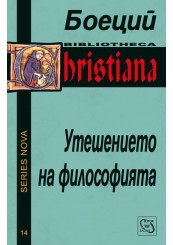Boethius

Anicius Manlius Severinus Boëthius, commonly called Boethius (c. 480–524 AD), was a Roman senator, consul, magister officiorum, and philosopher of the early 6th century. He was born four years after Odoacer deposed the last Roman Emperor and declared himself King of Italy, and entered public service under Ostrogothic King Theodoric the Great, who later imprisoned and executed him in 524 on charges of conspiracy to overthrow him. While jailed, Boethius composed his Consolation of Philosophy, a philosophical treatise on fortune, death, and other issues, which became one of the most popular and influential works of the Middle Ages.
Boethius was born in Rome to a patrician family around 480 AD, but his exact birth date is unknown. His family, the Anicii, included emperors Petronius Maximus and Olybrius and many consuls. His father, Manlius Boethius, who was appointed consul in 487, died while Boethius was young. Another patrician, Quintus Aurelius Memmius Symmachus, adopted and raised Boethius, instilling in him a love for literature and philosophy.
Both Memmius Symmachus and Boethius were fluent in Greek, an increasingly rare skill at the time in the Western Empire; for this reason, some scholars believe that Boethius was educated in the East. According to John Moorhead, the traditional view is that Boethius studied in Athens based on Cassiodorus's rhetoric describing Boethius' learning in one of his letters, but this appears to be a misreading and his studying in Athens is more likely a legend.
Pierre Courcelle has argued that Boethius studied at Alexandria with the Neo-Platonist philosopher Ammonius Hermiae. However, Moorhead observes that the evidence supporting Boethius having studied in Alexandria "is not as strong as it may appear", and adds that Boethius may have been able to acquire his formidable learning without travelling.
On account of his erudition, Boethius entered the service of Theodoric the Great at a young age and was already a senator by the age of 25. His earliest documented acts on behalf of the Ostrogothic ruler were to investigate allegations that the paymaster of Theodoric's bodyguards had debased the coins of their pay; to produce a waterclock for Theodoric to give to king Gundobad of the Burgunds; and to recruit a lyre-player to perform for Clovis, king of the Franks.
Boethius married his foster-father's daughter, Rusticiana; their children included two boys, Symmachus and Boethius.


